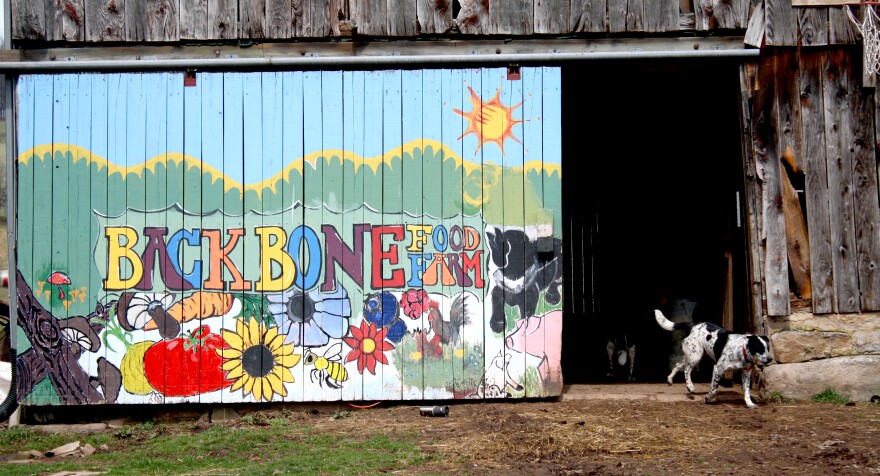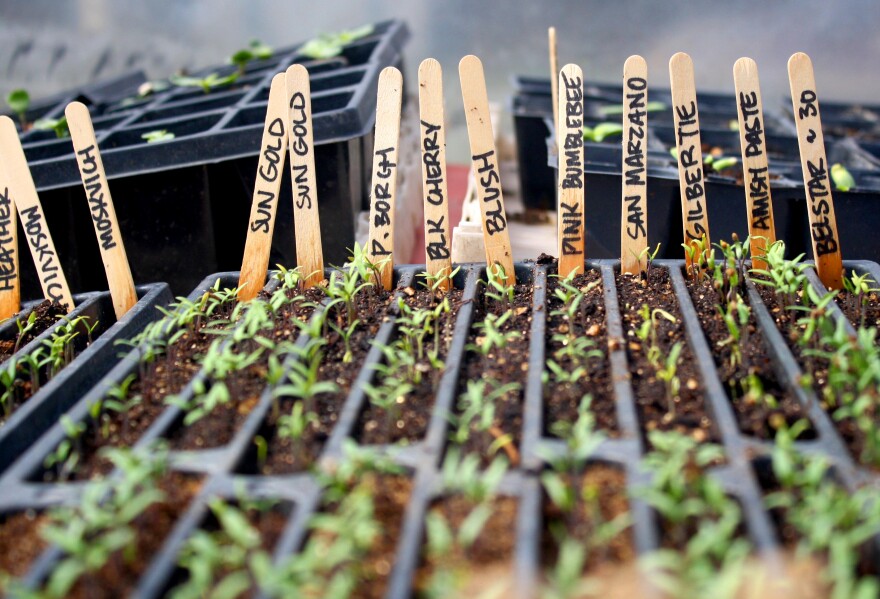Even if Backbone Food Farm didn’t sit below Backbone Mountain, its name still would be very appropriate. That’s because Max Dubansky and his family farm the way he learned from the old folks, letting pigs turn the soil and using horses to work the land.
Max Dubansky and his family farm 50 acres in Pleasant Valley outside Oakland, Maryland, on the edge of the Allegheny Mountains.
I joined Max for a walk around Backbone Farm in early spring. The sun was just breaking through the clouds onto a scene of serene, rolling green hills.
“Being high elevation where we are here, we like to grow a lot of cool-weather crops so, you know, lots of lettuces and greens, carrots,” he said.
The farm also produces several kinds of edible and medicinal mushrooms, along with berries and fruit.
The Old People
Max got his love of growing vegetables from his father. His parents moved to Garrett County from Baltimore in the 1970s so he could grow a large garden. But Max said it wasn’t until he left high school that he became interested in farming as a profession. He started care-taking a farm in the area and began learning the trade, mostly through trial and error.
“But the biggest asset for me was the old people. The last of the true old-timers were still around. And I learned an infinite amount from just hanging out with those guys about farming in general and working horses and making it on a farm without much. And so I give those old people a lot of credit for where we are today,” Max said.
Animals make the farm
In following those old traditions, animals have become an integral part of the farm.
“By having animals, that definitely helps keep everything in a balance. I feel like, you know, a farm isn’t really a farm until you have animals. It’s personal, personally I feel that way,” Max’s wife, Katherine, said.
She met Max while they both working on a small, organic farm outside Flintstone, Maryland. They’ve been married for 18 years and have four children. They began care-taking Backbone Food Farm 16 years ago and bought it outright in 2013.
Max explained that many of the farm’s fields were over-worked and depleted of nutrients when they took it over.
Large Black Hogs
“And the pigs have just been amazing as far as using their natural inclination to root. We’ve been able to plow large amounts of ground with them,” he said.
The pigs on the farm are a heritage breed, aptly called Large Black Hogs. They have black skin and hair, and they’re adapted to living outside.
“With the heritage breed too, they’re registered. There’s only like, 800 of these pigs in the entire country, so we’re kinda trying to get the stock back up,” Max said.
When the weather warms up, the pigs are moved into their summer pasture.
“Pig manure is really powerful stuff. And just aerating the soil up there where they are, we’ve noticed dramatic improvements in our pastures — like with our grass and clover growth,” Max said.
Horse Power
Backbone Food Farm stands out in the surrounding community of small growers because draft horses are used to do most of the work on the farm instead of tractors.
“Once the land is plowed, it’s all horse work. We do all the cultivating, all the bed-forming with horses,” he said.
Tractors are used sometimes, especially when time is short. But Max said he feels using a tractor disconnects him from the process of working the land.
“You can’t hear the birds singing. You can’t, you know, you’re in a cab, you can’t feel the wind or whatever. Where with horses, it slows the work down,” he said.
He said working with horses also brings a spirit of cooperation.
“It’s me and the horses are … We’re all the team that are working together and I have to pay attention constantly to how they are and how they’re feeling and they’re constantly paying attention to me. So it adds this whole other layer dynamic to the work that I just really enjoy. It makes me feel more involved with what I’m doing.”
Growing Fertilizer
We were standing on the edge of what looks to me like a field of short grass. The land in front of us was broken up into similar patches that extend into the distance. He only grows vegetables every other year on each patch. Max said what looks like grass is actually a cover crop that’s used to return nutrients to the soil in the years between vegetable harvests.
“Like this is rye and crimson clover, hairy vetch. There’s legumes in here, too, which fix nitrogen from the air. So we’re collecting free nitrogen,” Max said.
Max ripped a handful of leafy rye from the field were standing on, exposing the roots and soil beneath.
“You can see that little white ball right there,” he said.
He pointed out a white sphere about twice the size of a pinhead attached to a root.
“That’s actually a nitrogen nodule that the leaves have taken the nitrogen out of the air and have fixed it to the root. Then when you plow that in, it rots in and makes it available to other plants,” Max explained.
He said one advantage he has is lots of land. By using crop rotation and animals to work his fields, he can essentially grow his own fertilizer.
Closed Loop
So just about everything the farm needs to grow crops is generated on the land. Most of the waste that the animals produce is turned into fertilizer. That fertilizer is used to grow crops.
Katherine said using that closed-loop system helps cut down on the amount of pollutants the farm generates.
“We like to see the whole cycle of fertility right here so that we don’t have to import fertilizers and we don’t have to, you know, there’s not a whole lot of extra waste that comes out that we have to find a place for it to go.”
Passing on the Knowledge
On top of growing food for markets and restaurants in the area, Backbone Food Farm also serves as place to learn about small-scale, sustainable farming. Max and Katherine bring in two or three apprentices a year who stay on the farm for six months. Max said apprentices can range in age from 18 to 40.
“But it’s mostly younger people that are interested in farming and want to get an idea of what it actually takes to run a family farm,” he said.
“Well, I wanted to do some farming, I wanted to learn more about it, more about sustainable farming and hopefully farm in the future and make a living out of it.”
Andi Hinnenkamp grew up in Kansas and went to college in Nebraska. The 23-year-old said she hopes to take what she learns during her time as an intern on the farm back to Kansas.
“I think that would be really cool, something that could sustain a life but also make a living,” She said.
Passing on knowledge is important at Backbone. Sitting around the kitchen table in his farmhouse, Max said he feels fortunate to have learned from the last of the old folks in the area who used traditional methods.
“And so I feel almost like I’m this bridge. You know, that I’m really lucky that I caught the tail end of that and I’m this bridge that can take it to this, these people in their twenties, he said.”
Some of Backbone’s apprentices have gone on to start farms of their own nearby. The owners of Round Right farm in Preston County, and Savage River Farm, near Frostburg in Maryland, got their start under Max and Katherine’s tutelage.
You can find Backbone’s produce and shiitake logs at the Morgantown Farmers Market. They’re also at markets in Frostburg and Oakland in Maryland, where they sell their pork and beef.
































